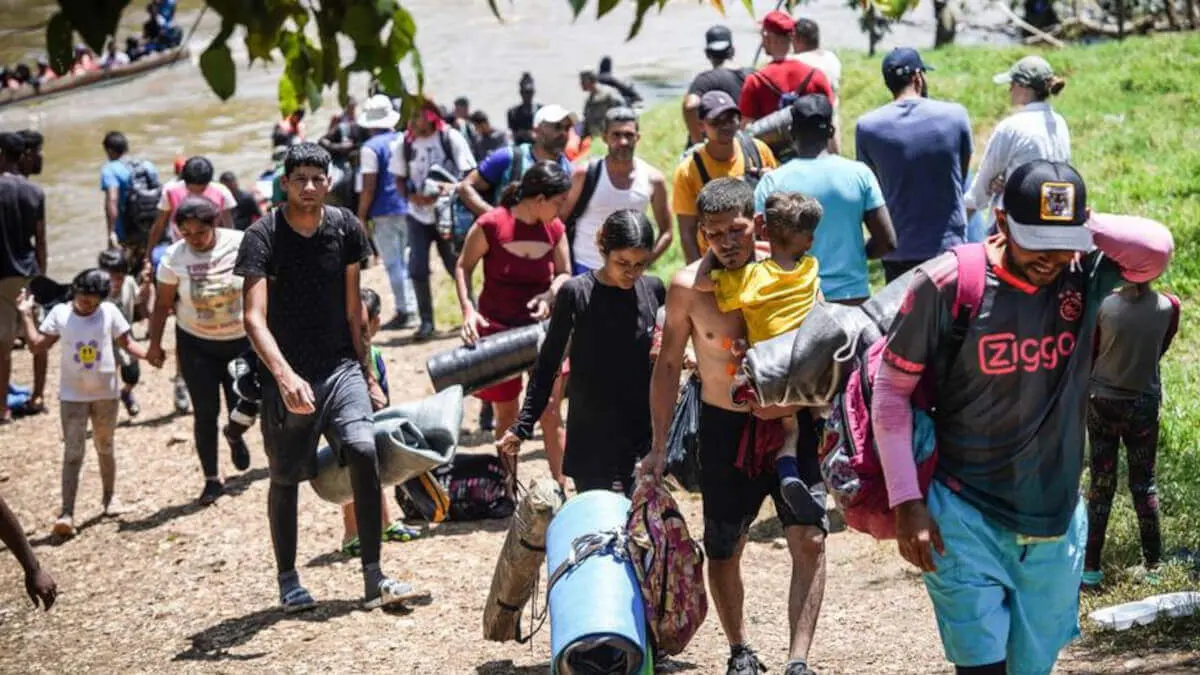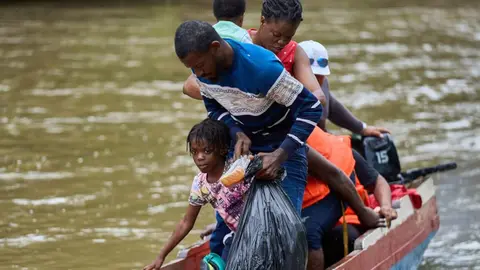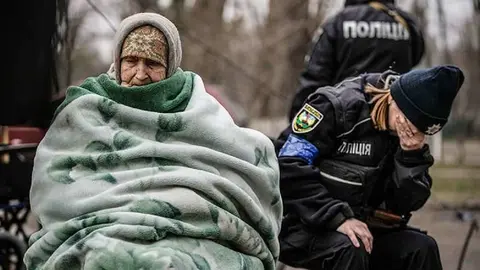The number of forcibly displaced people rises to historic levels and equals the population of a country like Mexico

- America's role
- Sudan, Congo, Myanmar, Gaza and Syria
- Internally displaced persons
- 43.4 million refugees worldwide
- Six million people returned home
Forced displacement (both within countries and internationally) reached historic levels worldwide last year, reveals the UN Refugee Agency 's (UNHCR) Global Trends 2024 Report.
The global increase in forced displacement, to 120 million in May 2024, was the twelfth consecutive annual increase and reflects both new and changing conflicts and the failure to resolve long-standing crises. The figure would make the global displaced population roughly equivalent to the population of Japan, the world's 12th largest country, the agency said.
In 2023, children under 17 accounted for 40% of all forcibly displaced people.
America's role
In 2023, the United States received the largest number of resettled refugees globally, with 75,100 people, followed by Canada, with nearly 51,100 refugees. In addition, Brazil, Colombia, Peru and Ecuador are carrying out extensive regularisation programmes for refugees and vulnerable migrants, ensuring documentation and access to services.
In the case of Venezuela, almost all of the 6.1 million registered Venezuelans have remained in Latin American countries (97%), mainly in Colombia (2.9 million), Peru (1 million), Ecuador (471,400) and Chile (435,800).
In addition, Colombia is leading efforts to implement innovative solutions for internally displaced persons.
José Samaniego, UNHCR's Regional Director for the Americas explained that "increasingly, countries in the region, together with UN agencies and our partners, and with the support of the international community, are applying a hemispheric approach in their joint work to address the root causes of displacement in countries of origin, respond to the humanitarian and protection needs of people in transit, and strengthen protection, inclusion and solutions in countries of destination and return".
The countries of the Americas commemorate this year the 40th Anniversary of the 1984 Cartagena Declaration on Refugees, a process led by the Government of Chile, with the support of the Governments of Brazil, Colombia and Mexico. The process will culminate in the adoption of a new Declaration and Plan of Action: a regional implementation of the Global Compact on Refugees. The spirit of Cartagena remains rooted in protection and solutions, promoting solidarity, international cooperation and shared responsibility.
Sudan, Congo, Myanmar, Gaza and Syria
A key factor driving up the numbers has been the devastating conflict in Sudan: since April 2023, more than 7.1 million new displacements have been recorded in the country, with a further 1.9 million outside the country. By the end of 2023, a total of 10.8 million Sudanese were uprooted.
In the Democratic Republic of Congo and Myanmar, millions of people were internally displaced last year due to fierce fighting, according to the report.
The Palestinian Refugee Agency (UNRWA) estimates that, by the end of last year, up to 1.7 million people (75% of the population) had been displaced in the Gaza Strip by catastrophic violence, with some Palestinian refugees having fled several times.
Syria remains the world's largest displacement crisis, with 13.8 million forcibly displaced inside and outside the country, UNHCR noted.
"Behind these stark and growing numbers lie countless human tragedies. Such suffering must spur the international community to act urgently to address the root causes of forced displacement," said the UN High Commissioner for Refugees.
"It is time for warring parties to respect the basic laws of war and international law. The fact is that without better cooperation and concerted efforts to address conflict, human rights violations and the climate crisis, displacement numbers will continue to rise, bringing with them new misery and costly humanitarian responses," added Filippo Grandi.
Internally displaced persons
The largest increase in displacement figures was among people fleeing conflict and remaining in their own country, reaching 68.3 million people according to the Internal Displacement Monitoring Centre, an increase of almost 50% in five years.
At the end of the year, Sudan (9.1 million), Syria (7.2 million), Colombia (6.9 million), the Democratic Republic of Congo (6.3 million) and Yemen (4.5 million) registered the highest number of internally displaced persons, the document notes.
43.4 million refugees worldwide
The number of refugees and other persons in need of international protection reached 43.4 million, if persons under the mandate of UNHCR and UNRWA are included. The vast majority of refugees are hosted in countries neighbouring their own, with 75% residing in low- and middle-income countries that together produce less than 20% of the world's income.
According to the report, nearly three out of four refugees (73%) come from just five countries: Afghanistan, Syria, Venezuela, Ukraine and Sudan.
Six million people returned home
The report showed that, worldwide, more than five million IDPs and one million refugees returned home in 2023. These figures show some progress towards longer-term solutions. On a positive note, resettlement arrivals increased to almost 160,000 in 2023.
"Refugees, and the communities that host them, need solidarity and support. They can and do contribute to societies when they are included," Grandi said.
"Equally, millions of people returned home last year, which represents an important ray of hope. Solutions exist. We have seen countries like Kenya leading the way in refugee inclusion, but real commitment is needed," he added.
The report also provides new analysis on the climate crisis and how it is increasingly and disproportionately affecting forcibly displaced people.
Given the immense challenges facing the 120 million forcibly displaced people outlined in the Global Trends report, UNHCR stressed that it remains steadfast in its commitment to offer new approaches and solutions to help people forced to flee their homes, wherever they may be.











